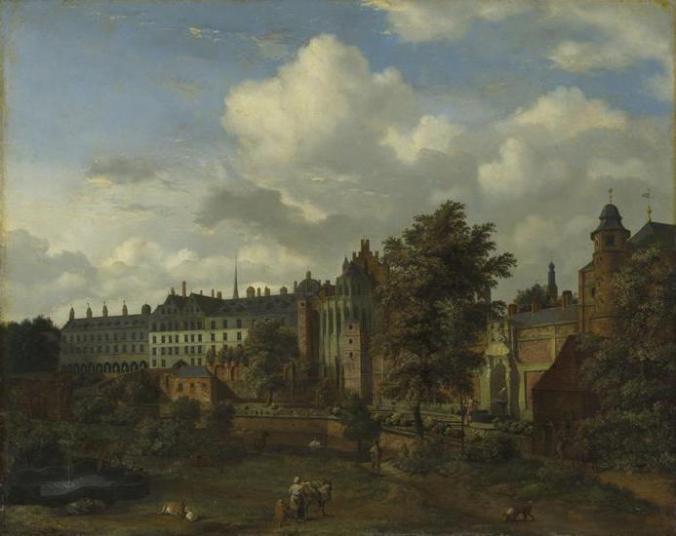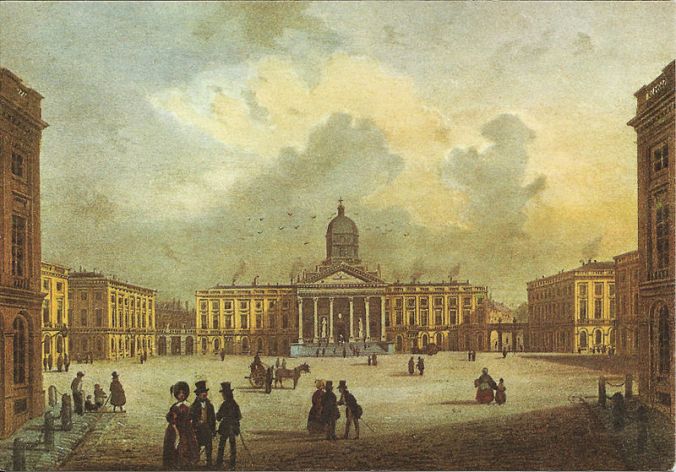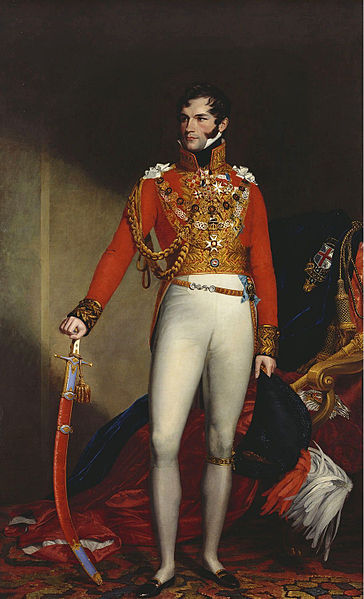
17th century view on the ancient palace of the dukes of Burgundy in Brussels by Jan van der Heyden and Adriaen van de Velde. The palace on the Coudenberg was the quintessential meeting place for European diplomats and a true expat heaven for centuries before it was completely destroyed by fire in 1731. Its foundations can still be visited today in the Museum on the Coudenberg.
When The Bulletin (for those who don’t know The Bulletin, it’s the first, best known and largest of the media targeting the Belgian expat community) featured the results of the Expat Explorer Survey undertaken by HSBC, the reactions on social media were far more interesting than the results of the survey itself. Many of the issues discussed on social media weren’t even part of the survey and had nothing whatsoever to do with the article featured in The Bulletin. As the comments on social media demonstrated, people are often bewildered by the culture that surrounds them, even if that culture is not so very different than the one they left behind.
First of all, HSBC is a global banking company and represents the financial interests of thousands of expats worldwide. So its decision to undertake an ‘Expat Explorer Survey’ is not so strange. Expats in 39 countries were for instance asked to reflect on financially related categories, like entrepreneurship and career growth, next to issues like health or safety. The Bulletin discussed the results for Belgium and for categories such as culture, integration or social life, we Belgians seemed to score quite badly. So on certain social media, expats and Belgians alike tried to find an explanation for what seemed to be a somewhat surprising problem: could it be that expats are not at all happy in this country?
What was clear from the first comment, was that misunderstandings rule among expats and ‘locals’ (which I personally find a bit of an offensive word to be honest) in Belgium. People discussed the Belgians’ lack of hospitality to foreigners, which is odd, considering Brussels happily houses some of the world’s most powerful international institutions and is home to quite a large expat community. Expat comments lamented the fact that Belgians apparently don’t want to be more involved in that community, which is even more odd, considering that some Belgians joined in the conversation and were thus clearly very much involved. One comment even suggested that the Belgians’ lack of enthusiasm had its roots in history: all those ‘foreign’ powers that had once ‘occupied’ Belgium must have made the Belgians weary of the expat community here.
Frustrations about the lack of ‘local’ friends, about a clear lack in the general understanding of Belgian culture and history to even frustrations about the ‘dull’ climate and generally ‘boring people’, all point to the fact that one huge issue is always overlooked in any survey on expat life. People are never interrogated on their actual knowledge of ‘local’ history and culture, nor on their ‘cultural wellbeing’. Personally I believe that the notion of a cultural wellbeing is an often overlooked, yet crucial factor in determining people’s happiness – whether they are expats or not.

Postcard of the Place Royale in Brussels ca. 1825-1860. This 18th century design was commissioned by duke Charles of Lorraine, governor-general of the Austrian Netherlands, for his fellow Habsburg ‘office holders’ and ‘diplomats’. In other words: built by an expat for other expats.
Culture is often interpreted in the sense of ‘participating in cultural life’, ‘visiting museums and exhibitions’, or of ‘getting to know the local cuisine’. But a culture is much, much more than just the outward, organised translation of customs and traditions that have been evolving for over a thousand years. It’s all very good and fine to visit all of Brussels’ museums – and don’t get me wrong, some of the finest museums in the world are located in Brussels, so by all means keep on visiting them – , but this will not help you one bit in getting to know more Belgians, or in understanding Belgian culture. True cultural awareness is not found in museums, it’s hidden in centuries of history. Yet of all the comments I read on social media, only one actually referred to history. It seems history, or rather a deeper understanding of certain historical trends, is not automatically linked to people’s ability to relate to a country’s general culture. Am I the only one to find this quite baffling?
On the other hand, both expats and Belgians pointed to the importance of learning the local language. In this case, it means expats have a pick of three languages, Dutch, French and German, the official languages in Belgium. But is it really true that expats will make friends faster or will integrate faster if they speak French in Brussels or Dutch in Gent? I don’t know of any survey – let alone a decent scientific study – that has investigated a direct link between knowledge of the language and the ease or speed in making local or expat friends.
One thing is certain however, ‘language’ is a key issue in Belgium. The whole country’s political, judicial and cultural system is based on the issue of language and the language barrier. Much more than actually speaking Dutch or French, the idea of language in itself is a key defining issue of Belgian identity. Personally, I speak English with my expat friends and I don’t really care if their French or Dutch are good enough to order a bread at the bakery. Even more, bakers in the most remote villages will probably happily sell you a bread in any language of your choosing as long as you pay for it. And as long as you know, and (make an effort to) understand that this does not mean the baker doesn’t care about language. In Belgium, language is more than speaking Dutch, French or German, it is speaking our culture. That is the real reason why most Belgians with a basic knowledge of English will easily switch to that language when you have so bravely tried to address them in French or Dutch. By trying to speak our language you have acknowledged the cultural importance of language, and in return you are ‘rewarded’. Only true language purists will keep on insisting that everyone who lives in Belgium – however briefly – will have to speak the language perfectly.
Yet in my opinion language does not account for the majority of what I have termed the ‘cultural malaise’ some expats seem to be experiencing in my home country. I’m not suggesting expats in Belgium experience anything as serious as a culture shock. After all, who is really shocked to be drinking the best beer in the world, eating the best chocolate in the world or seeing some of the finest historical buildings in the world? Enough with the clichés, Belgium is also an incredibly complicated country, not just because of a language barrier that has existed for nearly 2.000 years, and not even because most people – including Belgians – really don’t realise how many governments this country actually has.

Handsome king Leopold I was probably the country’s first expat. After his young wife the princess Charlotte of Wales died, he was invited to become king of the Belgians.
Over the course of its history, Belgium has played a major part in the development of what we could call a ‘modern industry’, its ruling dynasty at one point managed to control half of the monarchies in Europe and its political, economic and cultural traditions are much, much older than 1830. Its territory functioned as a true cultural crossroads for at least half a millennium, before the 19th century trend of creating nation states had gotten a hold on it. Sadly, it’s fascinating history is often overshadowed by its surreal political situation today. And that political situation – and some historians will probably disagree with me on this one – is also much more than the product of half a century’s full of ideological Flemish-Walloon opposition.
In any case, it’s not that I’m arguing that if expats had a better knowledge of its history Belgium would suddenly overtake Singapore in the Expat Explorer Survey’s bid for popularity. But I am convinced that with a better understanding of history, people’s cultural wellbeing would improve. And I equally believe that if we take better care of people’s cultural wellbeing, their general happiness will improve as well.
one key issue here seems to be that the targeted group for these questionnaires are people who identify themselves as ‘expats’ and are active in expat communities. I dare say the expat community is not the best way to find local friends …and I can imagine Belgium not being a great country for building a community of what are, essentially, conscious outsiders. Being part of a vibrant group of (let’s face it, usually Anglo) expats works best in a place that is in some way exotic: you can share your surprises over weird local customs, and most expats possibly already came with some sort of interest in the specific exoticism of the place (the Finnish expat community seems obsessed with Lapland and the Northern Lights). If you’re a typical expat, Belgium is necessarily going to look quite boring…because it might as well be England (it’s fairly old, the streets are cobbled and it’s raining all the time). That being said, it’s high time we all learn to be more encouraging to people who are trying to get to know our ‘local’ culture and language(s). Interrupting an early learner’s broken Dutch and switching to English is really just rude.
LikeLike
Yes, I agree with you on the fact that expat communities can seem to be quite closed off from ‘local’ communities. But that is also in part a prejudice that Belgians have towards the expat community. Yes, a lot of expats do send their children to international schools for instance, making it hard to become friends with Belgian mothers and fathers while waiting to pick up their kids at the school gate. But again, I wonder if that is really the whole picture. Considering Brussels is one of the most important stations for foreign diplomats for instance, they won’t be looking for exoticism, they know full well what to expect in Brussels, at least what their jobs and their careers are concerned. I also think a lot of expats are actively trying to comprehend Belgian culture and politics (good luck with that by the way). Just like you are doing in Helsinki now 😉 But regardless of the fact if you are an expat or a local or a foreigner or something in between, we hardly ever see historical knowledge as a gateway to cultural awareness. Personally, I feel this is something to reflect upon.
LikeLike
I am specifically referring to the people questioned in studies, though (presumably, these organizations don’t have access to everyone who is expatriated, but rather target organizations that are explicitly run and populated by people who, rather tellingly, prefer to be expats rather than immigrants). As for using history as a gateway to understanding culture: I heartily agree, although sharing misconceptions about history is probably an even better way to understanding people around you 😉
LikeLiked by 1 person